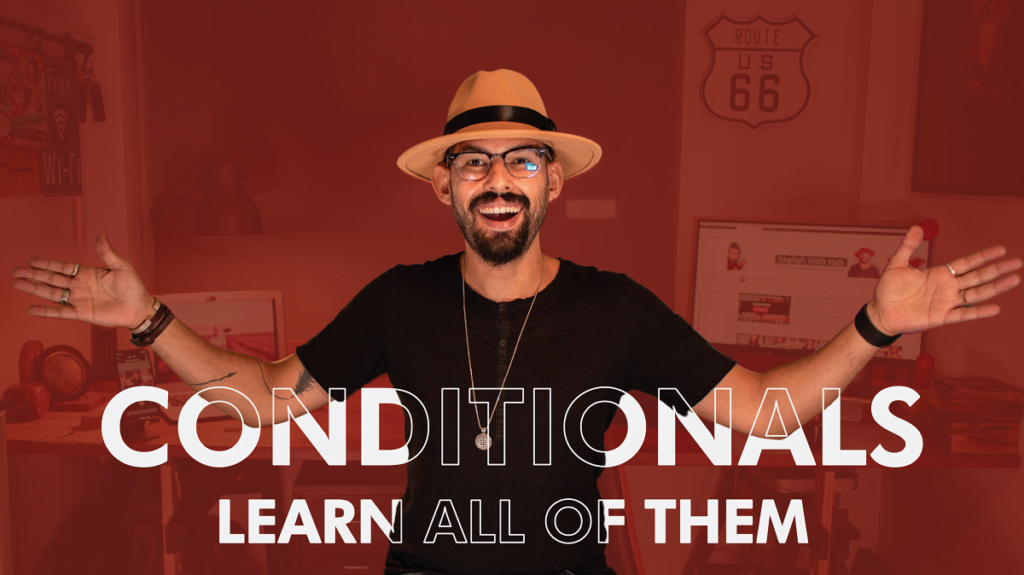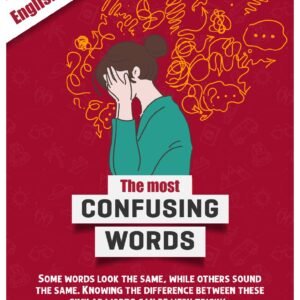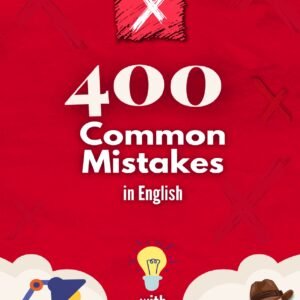Making conditional sentences is an everyday part of your native language, and introducing them to your English conversation can really improve your level of communication.
There are four conditionals in total and you will learn to use them gradually, obviously starting with the most basic ones – the zero and first conditional.
To have a general idea of how all the conditionals work, take a look at this overview so you can start to get an idea of what they are and when we use them.
What is a Conditional Sentence?
A conditional sentence is based on the word ‘if’.
There are always two parts to a conditional sentence – one part beginning with ‘if’ to describe a possible situation, and the second part which describes the consequence.
For example:
- “If it rains, we’ll get wet”.
We can also invert the two parts of a conditional sentence so that the ‘if’ part comes second, and this is especially common in questions.
For example:
- “What will you do if you miss the train?”
- “How can you finish the project if you don’t have a computer?”
- “What happens if the students don’t pass an exam?”
There are four types of conditional sentences:
- 0 – The zero conditional
- 1 – The first conditional
- 2 – The second conditional
- 3 – The third conditional
It is also possible to mix the second and third conditional. Let’s look at each conditional to see how we use them.
0 – Zero conditional
We can make a zero conditional sentence with two present simple verbs (one in the ‘if clause’ and one in the ‘main clause’):
The structure is: If + present simple, …. present simple
We use the zero conditional to talk about permanent truths, such as scientific facts, and general habits also when the result will always happen. I mean general truth.
- If you freeze water, it turns into ice.
- If you stand in the rain, you get wet
- If you touch a fire, you get burned.
- People die if they don’t eat.
- Snakes bite if they are scared
- If babies are hungry, they cry
1 – The First Conditional
We use the first conditional to talk about a realistic situation in the present or future.
The structure of the first conditional is as follows: If + present simple, … will + infinitive
- If you’re free later, we will go for a walk.
- If I study today, I will go to the party tonight.
- If I have enough money, I’ll buy some new shoes.
- She’ll miss the bus if she doesn’t leave soon.
- He’ll call if he needs help.
- Take a break if you’re tired.
The difference between First and Zero Conditional: the first conditional describes a particular situation, while the zero conditional describes what happens in general.
For example (zero conditional): if you sit in the sun, you get burned (here I’m talking about every time a person sits in the sun – the burning is a natural consequence of the sitting)
But (first conditional): if you sit in the sun, you’ll get burned (here I’m talking about what will happen today, another day might be different)
2 – The Second Conditional
We use the second conditional to talk about impossible situations in the present or future.
Here is the structure: If + past simple, … then would + infinitive
- If I had more time, I’d exercise more. (But I don’t have more time so I don’t.)
- If I were rich, I’d spend all my time traveling. (But I’m not rich so I can’t.)
- If he didn’t have to work late, he could go out with his girlfriend.
- What would you do if you were offered a job in Canada?
- You wouldn’t have to walk everywhere if you bought a bike.
A common expression used to give advice has the second conditional structure.
The expression is ‘If I were you, I’d..’, meaning ‘in your situation, this is what I would do’. For example:
- A: I’ve got a headache.
- B: If I were you, I’d take a pill.
- A: I don’t understand this.
- B: If I were you, I’d ask your teacher for help.
3 – The Third Conditional
We use the third conditional to talk about impossible situations, as in the second conditional, in the past. We often use the third conditional to describe regrets.
The structure is: If + past perfect, … would + have + past participle
- If she had studied, she would have passed the exam. (In this case we know “she didn’t study and so she didn’t pass”).
- If I hadn’t eaten so much, I wouldn’t have felt sick. (But I did eat a lot, and so I did feel sick).
- If we had left earlier, we would have arrived on time.
- If you hadn’t forgotten her birthday, she wouldn’t have been upset.
- If they had booked earlier, they could have found better seats.
- If I hadn’t learnt English, I wouldn’t have got this job.
- What would you have studied if you hadn’t done engineering?
- They wouldn’t have hired you if you hadn’t had some experience abroad.
Mixed Conditionals
It’s possible to combine the second and third conditional in one sentence when we want to make a hypothesis about the past that has a consequence in the present.
In this case, the structure is: If + past perfect, … would / could + Verb
- If you’d studied harder, you’d be at a higher level now.
- We’d be lying on a beach now if we hadn’t missed the plane.
- They’d have much more confidence if they hadn’t lost so many matches.
- What would you be doing now if you hadn’t decided to study?
Now you’ve seen all the English conditionals, start practicing by using them whenever you can. Make some of your own examples following the structure patterns written. If you practice, using conditionals will become easy!
To help you even more with conditionals, I made a video. You can watch it here: https://www.youtube.com/watch?v=cTbR41rpeZM










